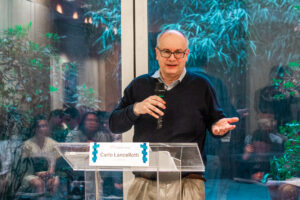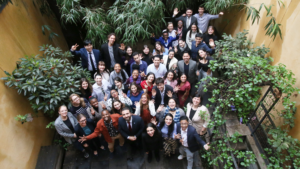 The Fifty-second session of the Commission for Social Development (CSocD 52) took place from February 11-21, 2014 at the United Nations Headquarters in New York. This year’s priority theme was “Promoting empowerment of people in achieving poverty eradication, social integration and full employment and decent work for all.” At the close of the CSocD 52 session, the Commission adopted six draft resolutions, including resolutions addressing the rights of persons with disabilities and the elderly, as well as one on the family in conjunction with the observance of the twentieth anniversary of the International Year of the Family (IYF 20).
The Fifty-second session of the Commission for Social Development (CSocD 52) took place from February 11-21, 2014 at the United Nations Headquarters in New York. This year’s priority theme was “Promoting empowerment of people in achieving poverty eradication, social integration and full employment and decent work for all.” At the close of the CSocD 52 session, the Commission adopted six draft resolutions, including resolutions addressing the rights of persons with disabilities and the elderly, as well as one on the family in conjunction with the observance of the twentieth anniversary of the International Year of the Family (IYF 20).
As a recap, the 10-day session included several high-level panel discussions and general debates on the priority theme. Governments, civil society representatives, youth delegates (including WYA) and UN officials participated in these sessions and highlighted issues of concern to them in moving the social development agenda forward Post-2015.
Prior to CSocD 52, WYA submitted a written statement to the Secretary General that was circulated due to WYA’s consultative status with the Economic and Social Council (ECOSOC). In line with the priority theme, WYA emphasized the need for policies and laws that are centered on the intrinsic dignity of a person. Only with such a foundation would conditions be created under which human beings can be empowered and flourish. During the Commission, WYA also delivered an oral statement emphasizing the need for States to fulfill their commitment to meet essential human needs, so that every person is able to exercise their ingenuity in finding solutions to end poverty, promote social integration and achieving full employment.
A closer look at the priority theme resolution indicates how important having a person-centered approach is in achieving fair and equitable economic and social development, as people are the principal resource of societies. The resolution highlights that in particular, this means having more meaningful participation in all parts of society for all persons, by empowering children, youth, women, older persons, persons with disabilities, indigenous peoples and other disadvantaged and vulnerable groups, in order to strengthen their “capacity to make informed decisions in exercising the right and responsibility to take an active part in the affairs of the community in which they live.”
These are admirable ideals and the resolution’s call to action enumerates some guidelines on how Member States can pursue a more person-centered approach in eradicating poverty. Those that are significant to WYA include the affirmation by Member States that social development is to enhance the quality of life of all people without discrimination, through empowering people by having more substantial public and private investment in human resource development and in capacity building, including in the health and education sectors. It addresses eradicating all forms of inequality by improving, ensuring and broadening the full participation of vulnerable groups (including women, elderly, children and youth) in “all spheres of political, economic, social and cultural life, as equal partners, and to improve their access to all resources needed for the full exercise of all their human rights and fundamental freedoms.” Finally, the resolution also emphasizes the importance of empowering youth to participate in the eradication of poverty through encouraging governments to develop policies to enhance the employability of youth through investing in youth employment, active labor market support and public-private partnerships to ensure their access to full and productive employment and decent work. This is heartening and very much in line with WYA’s mission.
CSocD produced a separate resolution on the observance of the IYF 20 that affirms the importance of families in sustainable development. The essential role that families play in sustainable development should be unequivocally recognized. As stated succinctly by H.E. Valentin Rybakov, Deputy Minister of Foreign Affairs of the Republic of Belarus, sitting on the panel on Social Drivers of Sustainable Development, “The family is the basic unit of the society and plays a key role in social development, and also is a strong force of social coherence, and integration. The family plays a crucial role in ensuring the balance of the social system and the sustainable development of any society.” He then emphasized that the Millennium Development Goals would not be accomplished without the “important contributions of individual family units of the world” and asked rhetorically, “How do we think that child mortality would go down, or the primary education rate would go up, without the facilitating action of parents?” This underlines the importance of celebrating the family and having a person-centered approach to eradicating poverty.
The World Youth Alliance continues its advocacy efforts to promote the human dignity at the upcoming Commissions: the Commission on the Status of Women (starting on Monday, March 10, 2014) and the Commission on Population and Development (starting on April 7, 2014).
By Natalie Lam, an Advocacy Fellow at the WYA Headquarters in New York







